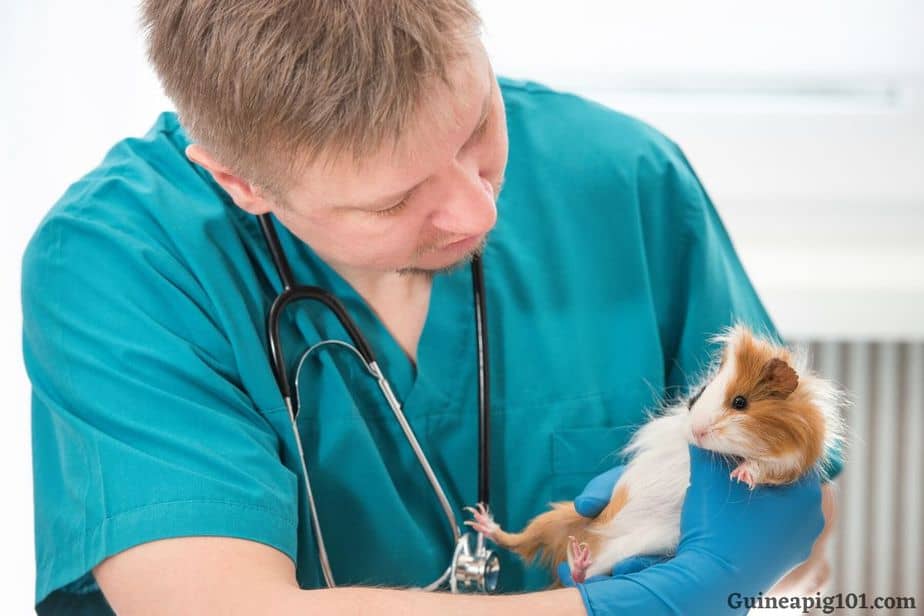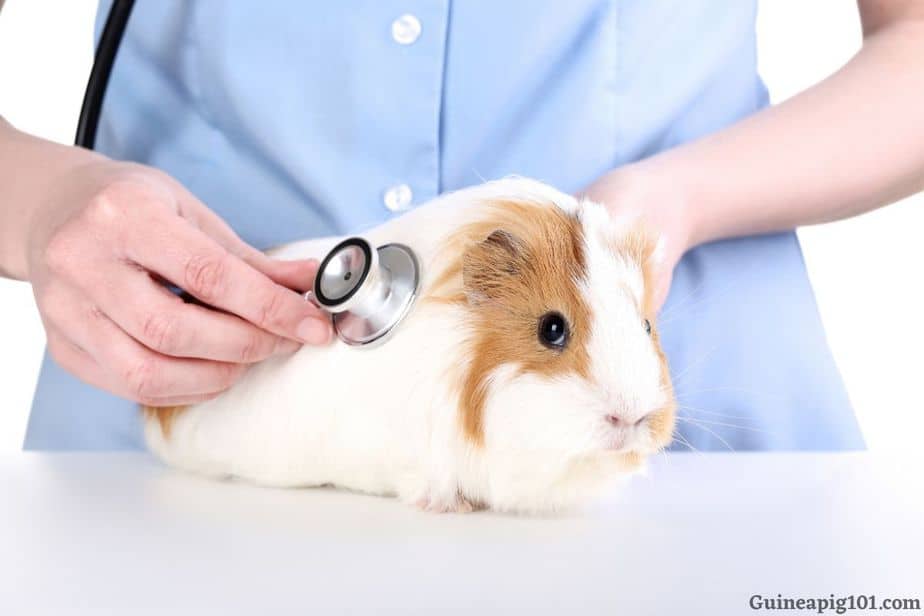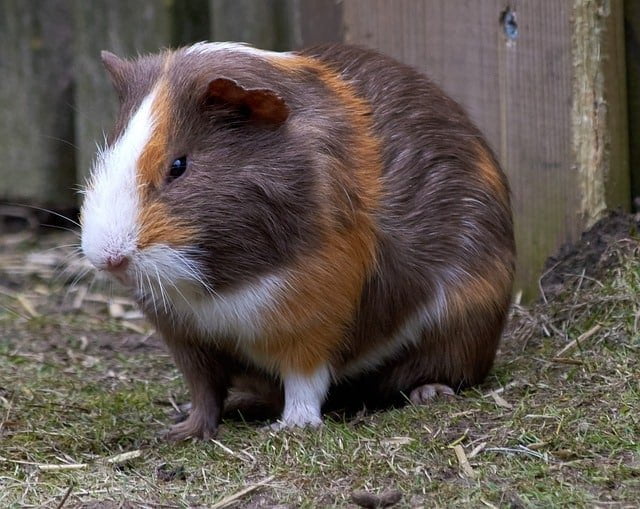You will never find a thrown up food in your guinea pigs cage even if they eat often. Likewise, primates and carnivores, herbivores can not move their contents towards the esophagus. That can make you think can guinea pigs vomit, or do they have some way else to deal with it.
Guinea pigs cannot throw up because their diaphragm cannot assemble the power to get moving the food through their throat. Guinea pigs don’t have a gag reflex. Their throat muscles also lack the strength to throw up.
Not only guinea pigs, rabbits, rats, and even horses come under the same category.
That may sound good, but it is not. If your guinea pig cannot vomit, they will not be able to purge their stomach.
That increases the risk of gastrointestinal blockage if they overeat.
Let us learn more about some health risks developed due to this.
Why can’t guinea pigs vomit?
As guinea pigs don’t have a gag reflex, they can’t vomit. What makes human throw up cannot be applied to guinea pigs. Guinea pigs will keep eating irrespective of the life threat they might have.
Apart from lacking gag reflex, guinea pigs also have a weak diaphragm. This means that your guinea pigs don’t have the strength to vomit.
Guinea pig’s digestive system is a one-way road where food gets entry through mouth and exit as poop.
As guinea pigs don’t have any idea about vomiting, they are not cautious about the same.
We go through specific warnings that indicate to us that it can make us sick. But unfortunately, guinea pigs have no way to understand the same.
Guinea pigs will always rely on you without understanding it. Guinea pigs should never reach the point where they need to throw up.
Do guinea pigs throw up in any way?
The nearest thing that guinea pigs can come to throwing up is coughing.
Guinea pigs have a bunch of molars hidden in the backside of their mouth.
The four incisors are necessary, but the real wonder happens in the back of their mouth, behind the closed cheeks.
Guinea pigs chew their food in this place before it goes down to their stomach.
When guinea pigs develop any problem with their back teeth, they are most likely to spit out their half-chewed that they have not swallowed yet.
If your guinea pig is coughing, there can be two reasons for the following:
- Your guinea pig is not well: Your guinea pig may be suffering from an infection.
- The Guinea pig has something stuck in their throat that they are trying to get rid of.
If Guinea pig has a choked throat, it will not be possible for them to even breathe, let alone eating something.
There is no way to induce your guinea pig to vomit. So, if something is stuck, you need to reach out for professional help immediately.
Medical issues caused by not throwing up
If your guinea pigs cannot vomit, it reduces your cleaning up work.
Despite this, the inability to throw up is not an excellent characteristic of your guinea pigs. It can lead to many health issues in our guinea pigs.
Some of them are as follows:
- Digestive Blockages: Guinea pigs come under constant risk of digestive blockages. If your piggies overeat, they will not be able to vomit out the undigested food. It will be stuck in their digestive tract, leading to Obstruction.
- Choking: If food is stuck in your guinea pig’s throat, it will be tough for them to get rid of it. You will have to immediately help them out as if it continues for a long time. It may be possible that they may lose their breath.
- Toxicity: Sometimes guinea pigs might consume something toxic, they can get rid of it by throwing up. Not only guinea but many other small animals also similar problems with vomiting.
Guinea pig’s inability to throw up should never be taken lightly.
You must make sure that you feed your guinea pig a healthy diet and always keep them far away from toxic food.
Inability to vomit can block a guinea pig’s gut

It would be best if you were very careful when you feed your guinea pig.
Your guinea pig may look very small to you, but their diet is not that small. Many guinea pigs will eat anything that is provided.
When you have your meal, your guinea pigs will try to tell you that they even want to eat.
But we will advise you not to share your meal with your guinea pigs even if they request by making noises.
Food like meat and bread have terrible consequences as your guinea pig will not be able to digest it, which can lead to gastrointestinal blockage.
What happens when your guinea pigs eat more than their digestive system can handle. Unsuitable food that your guinea pigs eat will remain in their stomach. Guinea pigs will not be able to gain enough nutrients or hydration.
So the best option is to always provide a lot of hay to your guinea pigs. The guinea pigs can’t eat hay in an excessive quantity.
Guinea pigs would be much happy if you provide them a good supply of hay. Pellets can also be served in small quantities. And if you want to give a treat to your guinea pigs, you can provide them little slices of fruits or vegetables.
We will advise you always to keep an eye on your guinea pigs grooming. As they are not able to vomit, it could be dangerous if they swallow fur. If they become careless, they can fill their gut with their hair.
A small number of hairballs can be anticipated, but if you find them struggling while they are eliminating, then their hair may be filling and blocking their intestines. On such your, guinea pigs will require urgent medical treatment.
Blockage in air passage in guinea pigs

Your guinea pigs are more prone to choking since they cannot vomit. If your guinea pig has overeaten, or too quickly, their airways can be blocked.
Some of the guinea pigs prefer to eat fast are liable to this condition. Some signs of blockage in the air passage of guinea pigs include:
- Try to breathe by their mouth: Guinea pigs are nasal breathers. If you find your guinea pig’s mouth open, then there is something wrong.
- Head shaking: Your guinea pig must be struggling to lose something that is stuck.
- Walking backward on the rear legs: If you find your guinea pigs head tilted back, your piggie is desperately struggling to take a breath.
- Swollen eyes: This is a general sign from guinea pig which indicates the storage of oxygen in their body.
You can also see your guinea pig making a variety of sounds.
Coughing and sneezing is more likely in it. Guinea pigs are calm animals. If they are making noises, there is something wrong with them which you will need to discover as soon as possible.
If your guinea pig has a blocked airway, it means that they are choking, which can be very dangerous if immediate action is not taken.
Guinea pig has something stuck in the throat
We understand that you can’t stay calm while you are seeing your guinea pig choking. But we will advise you not to panic, and follow the two methods that can help your guinea pig.
Here is where you must begin:
- Gently hold your guinea pig by your chest and make sure that you have covered your piggie from their neck
- Face your guinea pig nose downward, it can be a little awkward, but it is essential.
- Give a massage to your guinea pig using your finger on their stomach from the bottom of the abdomen to their ribs.
- Do it very softly as they have a very delicate body. You can break their ribs if you push hard. You should give a little pressure, though.
- It will help to give pressure on the lungs of your guinea pig, which will help to create a flow of air. If everything goes well, it will be sufficient to remove the trapped object from the throat.
The trapped object will fall out of the guinea pig’s mouth. As their head is facing earthward, it will not be able to get back to their throat.
It is possible that this method does not give fruitful results. In such a case, you can apply the second method, which is as follows:
- Gently hold your guinea pigs in between your arms.
- Firmly, hold your guinea pig in the air. Your piggie mustn’t wriggle.
- Then your next step is to move your arms downward. It will help to push your guinea pig’s internal body parts up into their body, as this applies pressure on their lungs.
- Your guinea pig will take a deep breath, which is enough to get the choked item out.
You should attempt this for 2-3 times for better results.
After such an incident, we will advise you to take your guinea pig to a vet as your guinea pig might be stressed. Some pieces of the items may also remain in their throat.
Guinea pigs cannot vomit after eating anything toxins
A big danger due to your guinea pig’s inability to vomit is the consumption of toxins.
Your guinea pig can’t throw up the poison once they have swallowed it.
Neither it will be possible for you to induce vomiting so that they can clear it out.
You should always keep your guinea pigs away from any kind of toxins. These includes:
- Chemicals which are found in plants and grass
- Any sort of rodent poison used for pest control
- You should keep them away from wild plants as they are poisonous. Even some house plants are toxic
- Human medicines
- Lead-based products.
- You should keep them far away from moldy or spoiled food.
- Any kind of flea treatment not supervised by the vet.
If you discover that your guinea pig has been infected by any sort of toxins, then reach out to a vet immediately.
The signs might include seizures, changes in body temperature, unable to move, not eating, etc.
You should always keep an eye on their food intake and them away from anything toxic.
Conclusion
- Due to a lack of strength in the muscles, guinea pigs cannot vomit.
- There are many several health problems that your guinea pigs can go through if they are not able to throw up.
- Overeating can cause an intestinal blockage to your guinea pig.
- Not throwing up can also lead to blocked airways in your guinea pigs.
- As guinea pigs are not able to vomit after consuming toxins, it is advisable to keep them away from harmful toxins.
Lastly, we would advise you to take care of your guinea pigs and keep them away from all harmful toxins, as this may give very terrible results to our guinea pigs.
In addition to this, always shower them with all your love and care.
Sources: Treatment efficacy in a soman-poisoned guinea pig model, CARING FOR YOUR GUINEA PIG, RESPIRATORY INFECTION, Dyspnea in guinea pigs, Viral Pneumonia in Guinea Pigs, Respiratory Bacterial Disease in Guinea Pigs, Mechanics of Respiration in Unanesthetized Guinea Pigs
